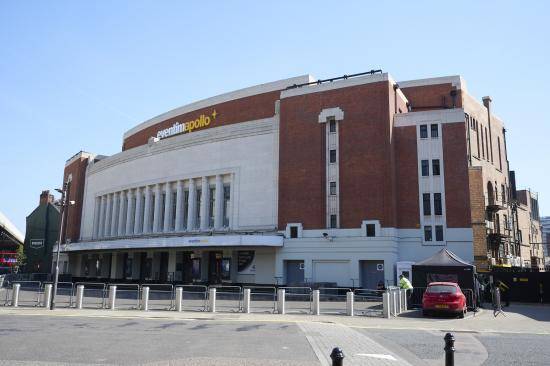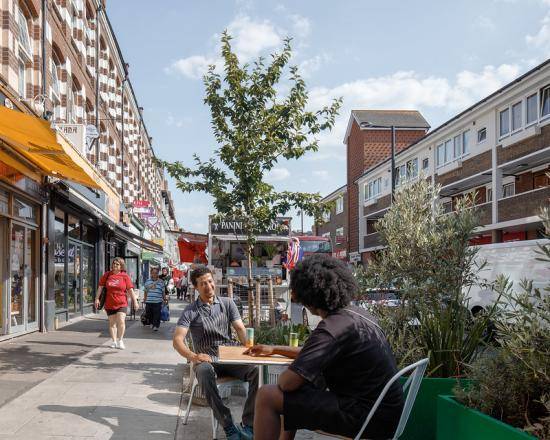Policy E10
Managing the impact of food, drink and entertainment uses
- The council will support proposals which contribute to cultural and creative activities during the day and at night-time to stimulate vibrancy and viability and promote diversity in our town centres, and will manage the impacts by ensuring that:
a) new proposals and extensions to existing uses, including the hours of use proposed should be appropriate to their location in the town centre hierarchy, and take account of the nature and character of the area.
- Extended opening may be permitted where:
a) the activities would not be likely to cause impact especially on local residents, and that, if there is potential to cause adverse impact, appropriate measures will be put in place to prevent it; and
b) there will not be any increase in the cumulative impact from these or similar activities, on an adjacent residential area; and
c) there is a high level of public transport accessibility to and from the premises at appropriate times; and
d) the activity will not be likely to lead to a demonstrable increase in car parking demand in surrounding residential streets and roads forming part of the Strategic London Road Network or the London Bus Priority Network; and
e) where a use will impact on local amenity, the council may also set an appropriate start time.
- Proposals for evening and food and drink uses should be accompanied by a management plan, including mitigation measures for any negative impacts of these uses.
- Impacts such as noise and light pollution on local wildlife and biodiversity should be considered through appropriate location, design and scheduling, taking account of Policy CR13 'Light Pollution'
- The use of outdoor areas including garden areas, rooftops, forecourts and pavements in association with food and drink uses will be supported only where:
a) this would not cause unacceptable harm to the amenity of adjoining residential property and the area generally, taking into account the size and type of the proposal, the hours of use proposed and the nature and character of the area; and
b) in the case of pavements, the width of the footway is adequate to avoid obstructing pedestrian flow, and the use is arranged so as not to be a hazard to people with disabilities and older people and families with small children. This may require a suitable means of enclosure or boundary to demarcate the extent of the use.
- The council will refuse proposals that result in an over-concentration of similar uses (such as nightclubs, public houses, bars and take-aways) in any one area and/or that would result in an adverse impact on the amenity of nearby users as well as surrounding residential areas.
- Planning applications for food and drink uses where home delivery of food is proposed must include a Transport Plan and a Delivery and Servicing Plan to enable assessment of impacts. Proposals for hot food takeaways and fast-food outlets will be refused:
a) within walking distance of schools and other places where children and young people congregate, unless the location is within a designated town centre, Regeneration Area of Site Allocation where these uses are indicated as suitable uses; or
b) in locations where there is evidence that a concentration of such uses is having an adverse impact on local health, pollution or anti-social behaviour.
- The Agent of Change principle will be applied to proposals which would introduce residential and other sensitive uses such as care homes, schools or childcare within close proximity to established or planned licensable premises including for the sale or supply of alcohol, the provision of regulated entertainment (like live or recorded music, theatrical performances, etc.), and the provision of late-night refreshments.
- The proposed residential new use will need to identify impacts and demonstrate that it is capable of fully mitigating its impact, on established uses and future occupiers.
- The council will manage the impacts primarily through its licencing regime and, where a planning application is received, by applying Agent of Change principles, and through planning conditions.
6.71 Hammersmith and Fulham has an extensive evening and night time economy which is centred in the three town centres. The council's Industrial Strategy – Upstream - promotes the Evening Economy in Hammersmith and Fulham to support diversification and vibrancy into the town centres, so that they are vibrant place to spend time once shops and offices have closed. For the purposes of this policy, they comprise food and drink uses (use class E) pubs and theatres (sui generis use), cultural and entertainment uses (use class E). They are defined as Main Town Centre uses in national planning policy (NPPF 2025) and the London Plan.

Night time economy
6.72 The council also wishes to encourage this activity, and further opportunities to enhance the night time economy in the regeneration areas as part of mixed-use developments. Activities such as restaurants, bars and pubs, cinemas and theatres, add variety and vitality to the town centres and, together with facilities in local centres, can provide services for the local community and visitors to the borough. In addition, these uses can provide important employment and economic development opportunities for the community. Changes of use between uses within Class E of the Use Classes Order do not require planning permission, which limits the scope of this policy's application. Where planning permission is required, the Council may impose conditions to restrict further change of use in the future, for example, to uses that could compromise the viability and vitality of the borough's centres. In planning for economic growth and successful town centres, the Council will seek to achieve an appropriate balance between physical, social and economic development and environmental protection. Larger format uses will be directed to the town centres and regeneration areas .
6.73 Concentrations of similar uses can give rise to harmful impacts such as noise, litter, traffic generation including from waiting delivery drivers, and lack of active frontages during the day. The London Plan encourages boroughs to consider appropriate management strategies and mitigation measures. Harmful impacts on residents and other noise sensitive uses will be identified via requiring applicants to apply the Agent of Change principles to their proposals, and managed through the council's licencing powers and planning conditions as appropriate.
Licensing
6.74 The council's planning policy is complemented by its licensing policy which is designed to maintain a dynamic, innovative and attractive place to live, work and relax. The council may also use its licensing powers to control the scale and nature of new proposals, including how premises are managed, notably through regulation of opening and closing times. In addition, because of the impact that some uses may have on amenity, planning conditions may be applied to control hours of early morning opening. The council works closely with the police, the fire authority, local businesses, community representatives and local people in meeting these objectives. The licensing policy recognises that certain types of licensed premises can lead to an increase in anti-social behaviour and the policy is designed to assist in prevention of crime and disorder in safeguarding public safety, in the prevention of public nuisance and in the protection of children from harm. It also takes account of concentration of similar use and their/cumulative impact. The council requires alcohol licence applicants to have planning permission before applying for a licence, and this allows the planning consent to determine the licensed hours of operation thereby helping to protect surrounding residential uses.

Residential amenity
6.75 In certain cases, where there is clear evidence that particular types of use will have serious effects on residential amenity or the environment, the council will consider imposing conditions that restrict future changes of use which the Use Classes Order would otherwise allow. Where premises do not require planning permission or already have consent, it will not be possible to control hours of operation through the planning process. Through town centre management initiatives, the council will endeavour to ensure that the night time economy is managed in a way that benefits residents, visitors and businesses.
Hot food takeaways
6.76 The updated NPPF (2025) sets out a 'presumption against' principle for new hot food takeaways This means that proposals for hot food takeaways and fast-food outlets will be refused in locations:
- within walking distance of schools and other places where children and young people congregate, unless the location is within a designated town centre; or
- in locations where there is evidence that a concentration of such uses is having an adverse impact on local health, pollution or anti-social behaviour.
6.77 The council concurs with the NPPF's criteria- based approach to determining planning applications for new hot food takeaways. Hot food takeaways were previously classified under Use Class A5. However, with the introduction of the new Use Classes Order in September 2020, they are now classified as sui generis. This means they don't fall under any specific use class and don't automatically have permitted development rights.
6.78 Growth in the food delivery sector, especially after Covid pandemic, can lead to concentrations of delivery drivers often on e-motorbikes or scooters congregating outside premises, and which has given rise to litter and obstruction of footpaths and highways in parts of the borough. Some of the remedies may relate to highway regulations, however planning conditions can also be used to manage this. There is additional guidance available from the council relating to the provision of tables and chairs on the public highway.
6.79 Most fast-food outlets, including those with seating, now fall under Class E (Commercial, Business and Services) and would normally enjoy permitted development rights to change into a number of commercial uses. In these circumstances the council will seek to mitigate adverse in impacts such as pollution and parking and highways matters through other powers/controls.
6.80 Proposals will be assessed against the 'agent of change' principle, as detailed in the NPPF and the London Plan. The proposed development must be an acceptable use of land at the outset rather than rely on mitigation through the control of processes or emissions. Applying the agent of change principles means that if a new noise-generating use is proposed close to existing noise-sensitive uses the onus is on the new use to ensure it is designed to protect existing users or residents from noise and other impacts and will be required to provide suitable mitigation before the development has been completed